Introduction
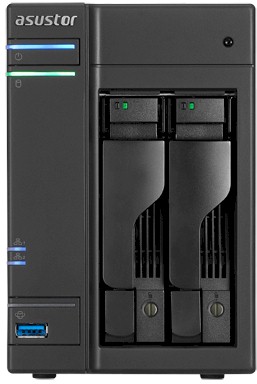
| At a glance | |
|---|---|
| Product | ASUSTOR NAS Server (AS6102T) [Website] |
| Summary | Two-bay dual-core Intel N3050 “Braswell” Celeron NAS with lots of ports and wide range of downloadable apps. |
| Pros | • Wide range of downloadable apps • Consistent File Copy Write and Read performance for all RAID levels • Quiet |
| Cons | • Relatively slow attached backup performance • Relatively expensive |
Typical Price: $0 Buy From Amazon

| At a glance | |
|---|---|
| Product | ASUSTOR NAS Server (AS6104T) [Website] |
| Summary | Four-bay dual-core Intel N3050 “Braswell” Celeron NAS with lots of ports and wide range of downloadable apps. |
| Pros | • Wide range of downloadable apps • Consistent File Copy Write and Read performance for all RAID levels • Quiet |
| Cons | • Relatively slow attached backup performance • Relatively expensive |
Typical Price: $0 Buy From Amazon
I recently reviewed ASUSTOR’s AX620XT NAS family, geared to the “Power User to Business” user. This review will focus on the latest entries to the Home to Power User category, the AS6102T (2 drive) and AS6104 (four drive) NASes.
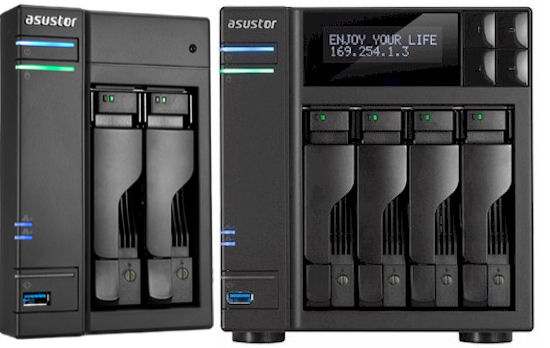
ASUSTOR AS6102T & AS6104T
The AS610XT NASes are virtually identical to the AS620XT NASes with the exception of the processor, memory, LCD panel and drive tray locks. In fact, the board photo shown in the AS620XT review actually shows “AS6104T” marked on the board.
The AS6104 lacks the drive tray locks and LCD display found on the AS6204T. None of the ASUSTOR two-bay models have an LCD display. The chart below, generated from our NAS Charts, shows the four-bay version of three ASUSTOR NAS families. Also included is the four-bay version of the AS510XT family reviewed here. This review will use these three families for comparison in the performance section of the review below.
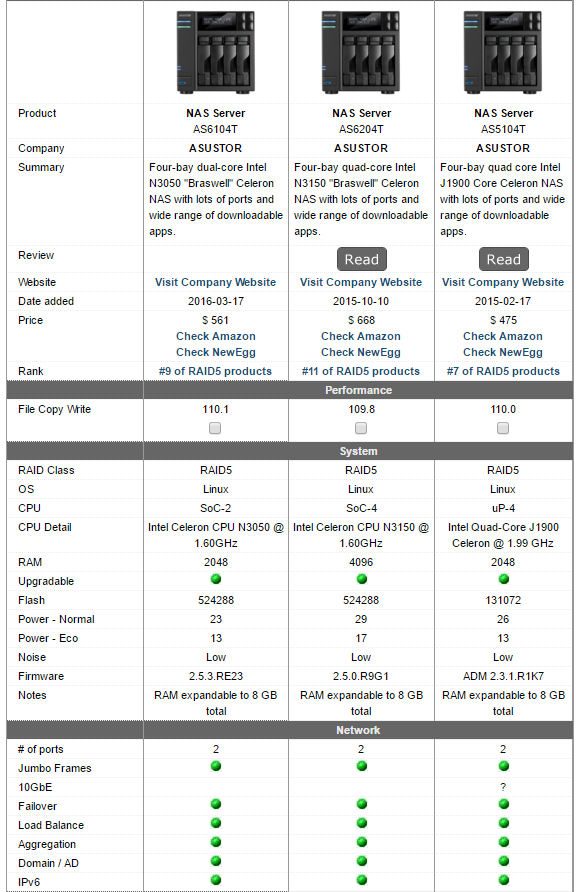
ASUSTOR feature comparison
All of the other features of the AS610XT family of NASes are identical to those of the AS620XT family except as noted above. Since the only other differences are in performance, let’s get right to it.
Performance
ADM 2.5.3.RE23 firmware was loaded onto an AS6104T and performance tests were run using the Revision 5 NAS test process. Since the AS6102T uses the same processor, RAM and Ethernet components, all testing was done on the AS6104T. The AS6104T tests used four drives configured in single RAID 0, 5 and 10 volumes. The AS6102T tests used two drives in single RAID 0 and 1 volumes. All tests were run using Western Digital Red 1 TB (WD10EFRX) drives (x4 SNB supplied).
The composite image below shows how the AS6102T and the AS6104T compare to other products for File Copy Write Performance The File Copy Write test for the two-bay test ASUSTOR AS6102T was 105 MB/s and the AS6104T turned in 110 MB/s.
Note that quite a few NASes in both charts are clustered around 110 MB/s. That’s about the maximum throughput that you can achieve with single client Gigabit Ethernet testing. While the two-bay performance was slightly lower, we consider performance within 5% equal for ranking purposes.
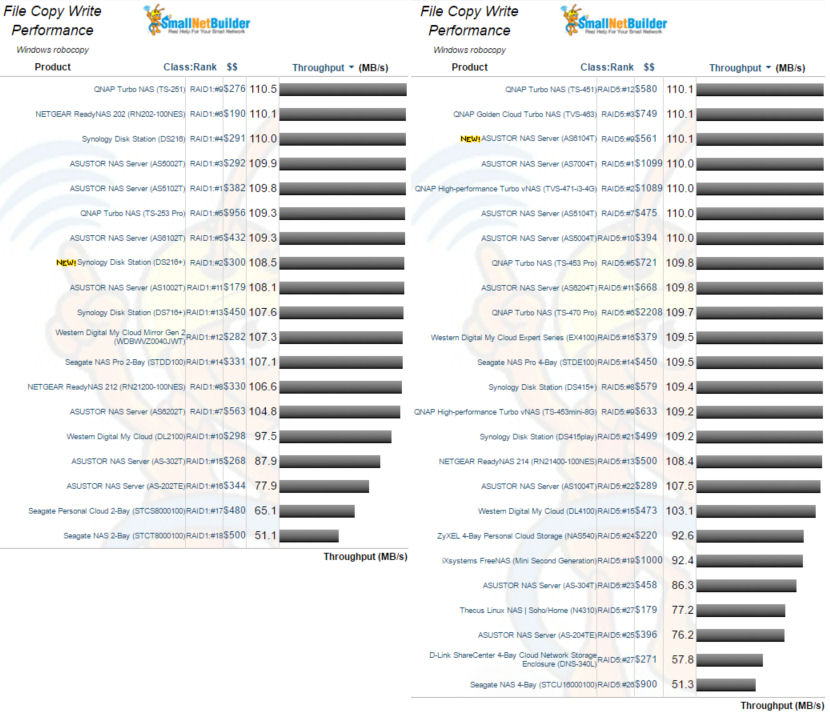
ASUSTOR AS6102T and AS6104T file copy write performance comparison
Performance – Two Bay
For the two drive comparison, I chose the ASUSTOR AS6202T and the AS5102T. File copy write and read performance was above 100MB/s for both RAID0 and RAID1 for all products. Similarly, NASPT File copy to NAS and File copy from NAS results were similar for all three products with the AS5102T holding a slight edge over the other two for NASPT File copy to NAS for both RAID levels.
For USB 3 Backup (all formats), eSATA backup (all formats), network backup, the AS6102T trailed the other two ASUSTOR NASes on all tests. For iSCSI Write and Read tests, the AS6102T had slightly better scores than the AS6202T, but significantly trailed the AS5102T for both tests.
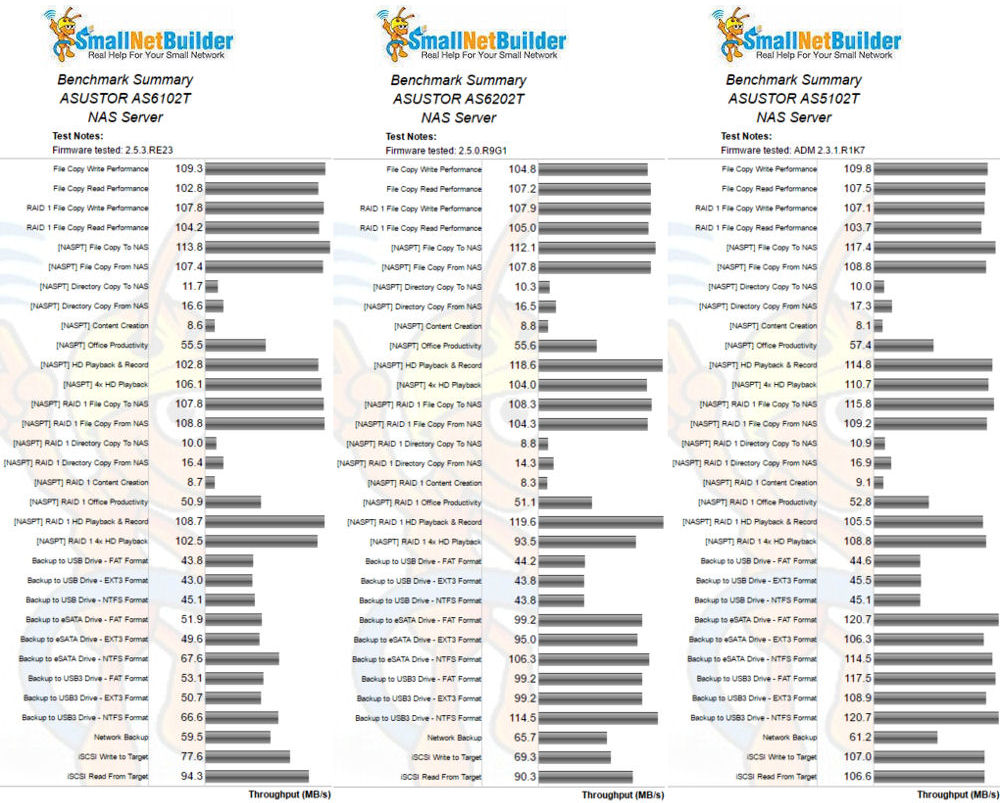
ASUSTOR AS6102T, ASUSTOR AS6202T and ASUSTOR AS5102T Benchmark summary comparison
The NAS Ranker, filtered for RAID1 and Revision 5 testing shows the ASUSTOR AS5102T holding on to its #1 ranking. The number #2 ranking was taken over by the recently reviewed Synology DS216+. The ASUSTOR AS5002T dropped to #3 and the AS6102T earned a #5 ranking. The third product used in our comparison, which was also the most expensive of the three, was the ASUSTOR AS6204T that ranked #7.
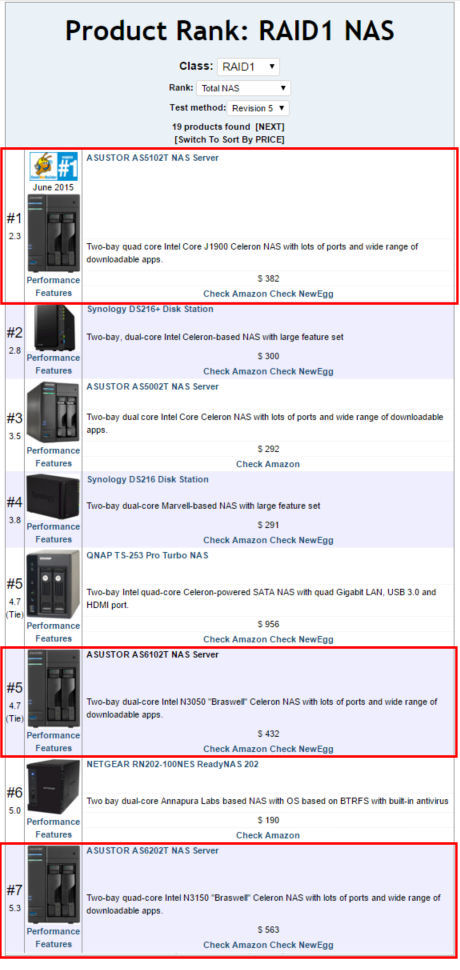
TOTAL NAS Rank for RAID1 test method Revision 5 NASes
The chart below shows the individual and category scores for the same three NASes used in the 2 drive benchmark summaries above – the ASUSTOR AS6102T, ASUSTOR AS6202T and ASUSTOR AS5102T. The AS6102T earned a #5 ranking. It had category rankings below the other two ASUSTOR NASes for the Video and Backup categories. Interestingly, it outperformed the AS6202T in both the Write and Read categories.
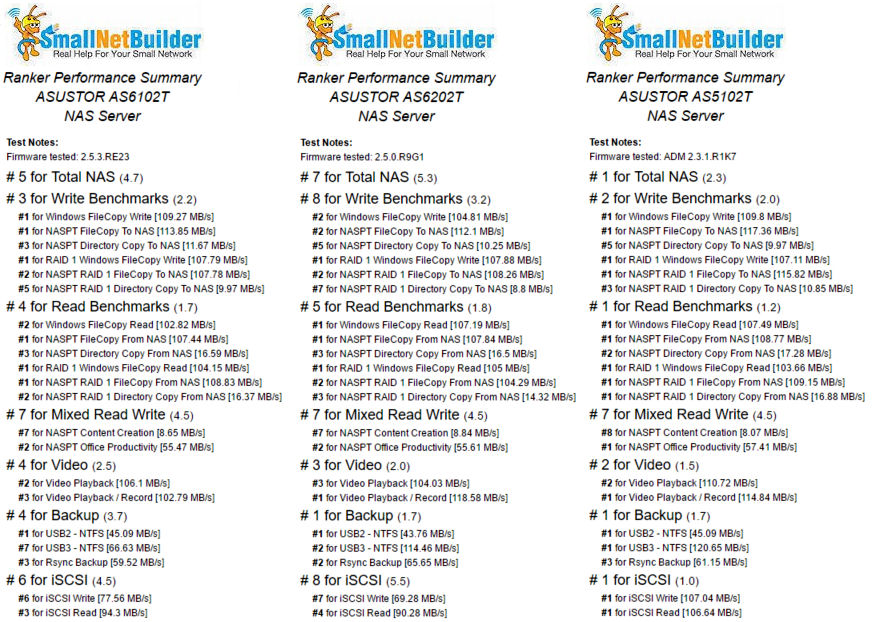
Ranker Performance Summary comparison of the ASUSTOR AS6102T, ASUSTOR AS6202T and ASUSTOR AS5102
Performance – Four Bay
For four drive NASes, I used the corresponding four-bay models of the NASes shown above. The chart below shows the ASUSTOR AS6104T, AS6204T and AS5104T. File copy Write and File Copy Read results were consistent across all RAID levels (RAID 0, 5, & 10) for all NASes with the exception of the relatively low performance of RAID 5 and RAID 10 File Copy Read performance on the AS6204T.
As with the 2-bay AS6102T, most backup operations on the AS6104T were slower than the other ASUSTOR NASes. iSCSI Write and Read results were better than the iSCSI results on AS6102T, but still trailed the other two four-bay ASUSTOR NASes.
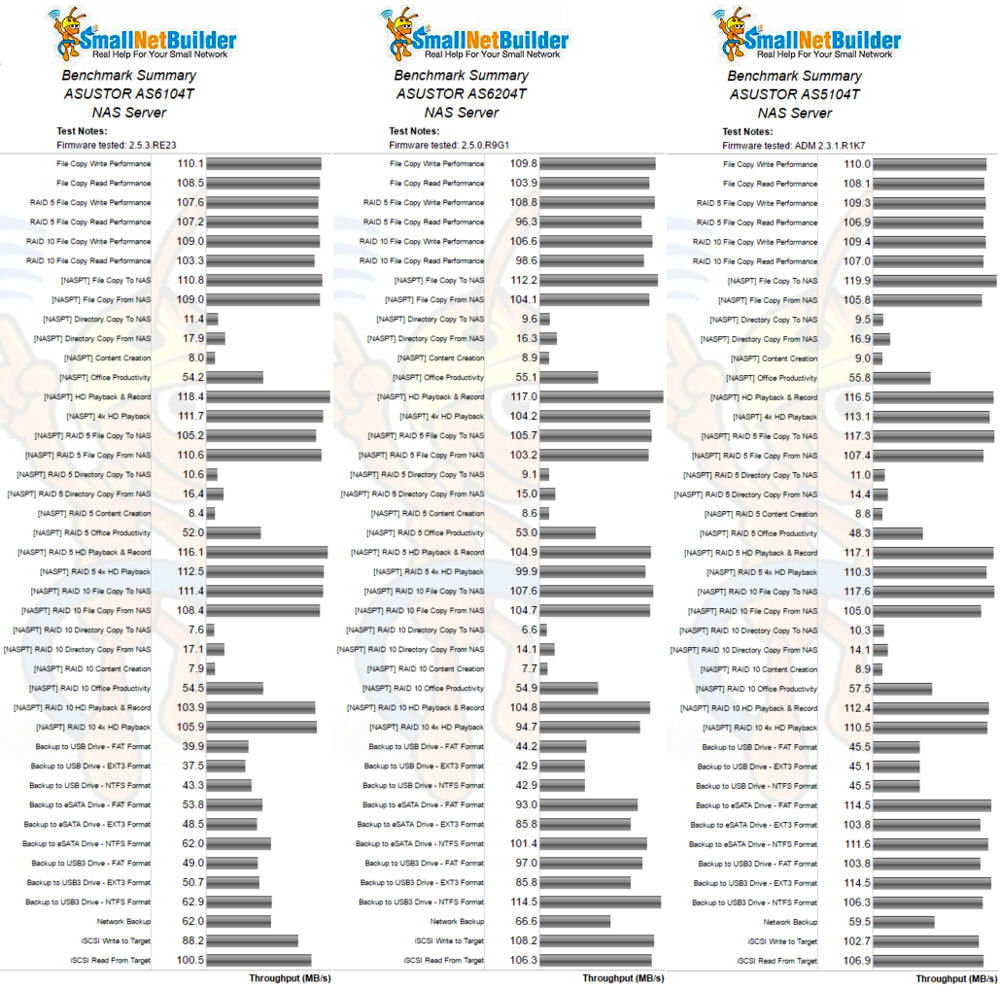
ASUSTOR AS6104T, ASUSTOR AS6204T and ASUSTOR AS5104T Benchmark summary comparison
As with the RAID1 rankings above, I used the NAS Ranker to filter for RAID5 class products. Since there were quite a few products with better rankings than the ASUSTOR AS6204T’s #11 ranking, I created a composite image showing the results in a two column format. (I also removed the QNAP TS-653 Pro and TS853 Pro, since they were six and eight drive versions of the TS-453 Pro.)
Of the three products compared in this review, the AS5104T, ranked #7, had the highest ranking. The AS6104T ranked in the middle of the three at #9. And, like the two bay version of the AS620XT family, the AS6204T had the lowest ranking of the three. It ranked #11 and was the most expensive.
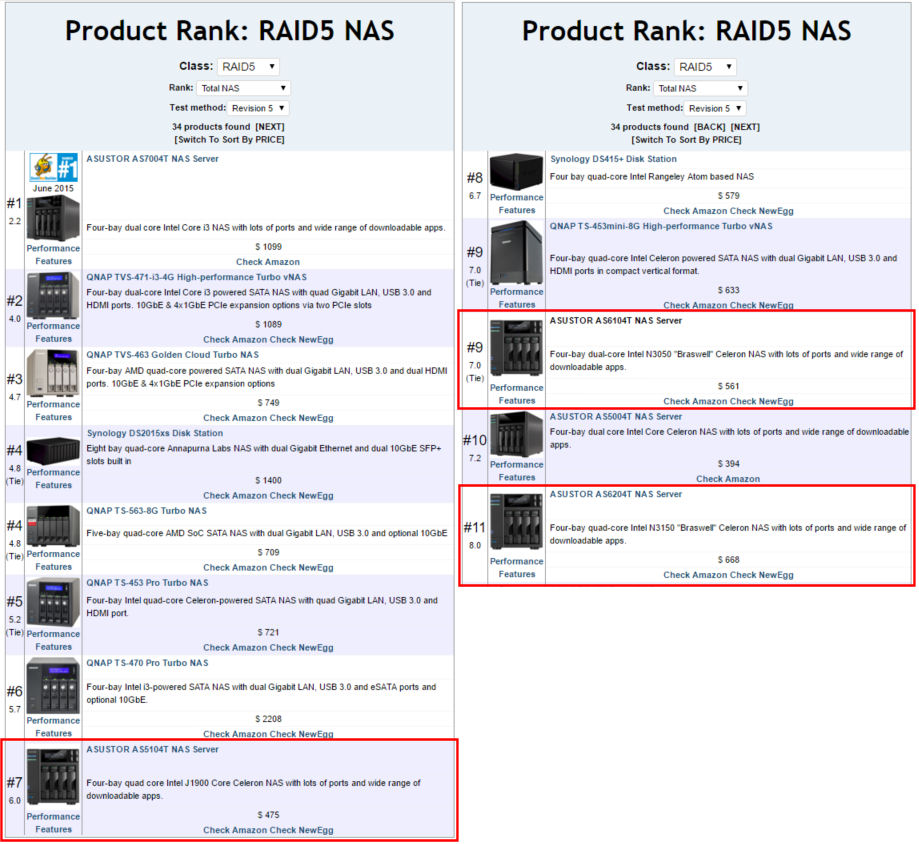
TOTAL NAS Rank for RAID5 test method Revision 5 NASes
For RAID 5 performance comparisons, I used the same four drive NASes used in the benchmark summary comparisons above.
Looking at the subcategories, the results were pretty much as expected. The AS6104T had its best category rankings for Read Benchmarks where it ranked #2 and for Video where it tied with the AS5104T with a #2 ranking. Not surprisingly, the category scores for Backup and iSCSI ranked below the other two ASUSTOR NASes.
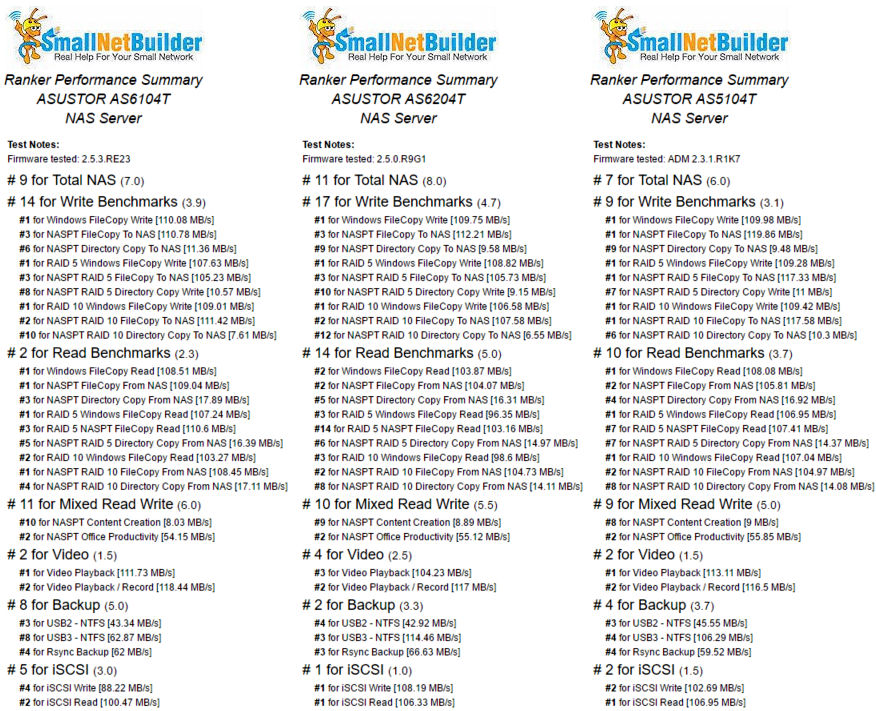
Ranker Performance Summary comparison
Closing Thoughts
As noted in the introduction, the AS610XT and AS620XT NASes share a lot of common features. The major differences are the processor and amount of RAM. But the dual-core AS610XT NASes had category wins over the quad-core AS620XT NASes in multiple Write and Read categories.
For two drive NASes, the ASUSTOR AS5102T still holds the #1 ranking. The four top ranked two-bay NASes all have better Total NAS scores and are cheaper than the AS6104T.
For four-bay NASes, there are significantly more products in our charts. If you sort the NAS Ranker by price, you see that there’s only one product with a lower price and better Total NAS score than the #9 ranked AS6104T: the #7 ranked ASUSTOR at $475. If you’re looking to save a few dollars, the ASUSTOR AS5004T ranked #10 and is priced at $394 as I write this.
ASUSTOR’s marketing materials tout that both the AS610XT and AS620XT families have a hardware encryption engine that excels at reading and writing encrypted data. Unfortunately, our benchmarks don’t include encrypted volume testing. However, ASUSTOR has posted some of their own performance results for AES 256-bit Windows Read/Write tests shown below. Note aggregated links are used in the tests.
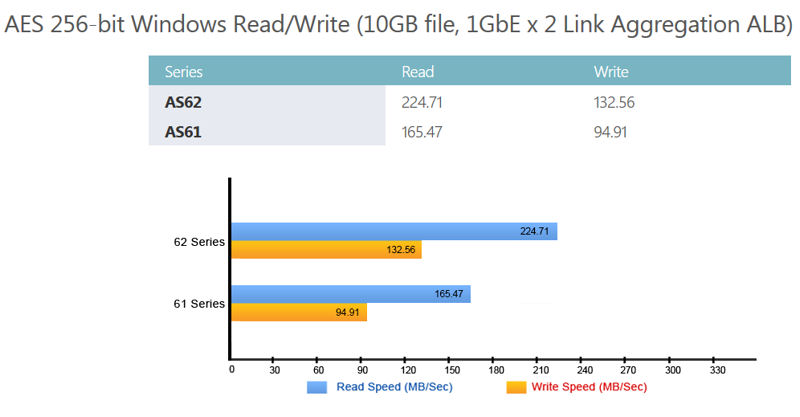
Performance tests for AES 256 bit Windows Read/Write from ASUSTOR website
Looking at the chart below and based on price and performance for the tests that we perform, the ASUSTOR AS510XT NASes still offer the best bang for the buck. With the AS510XT, you’ll be giving up 4K video capability and hardware assisted encryption. But you’ll get a lot of performance at a reasonable price.
